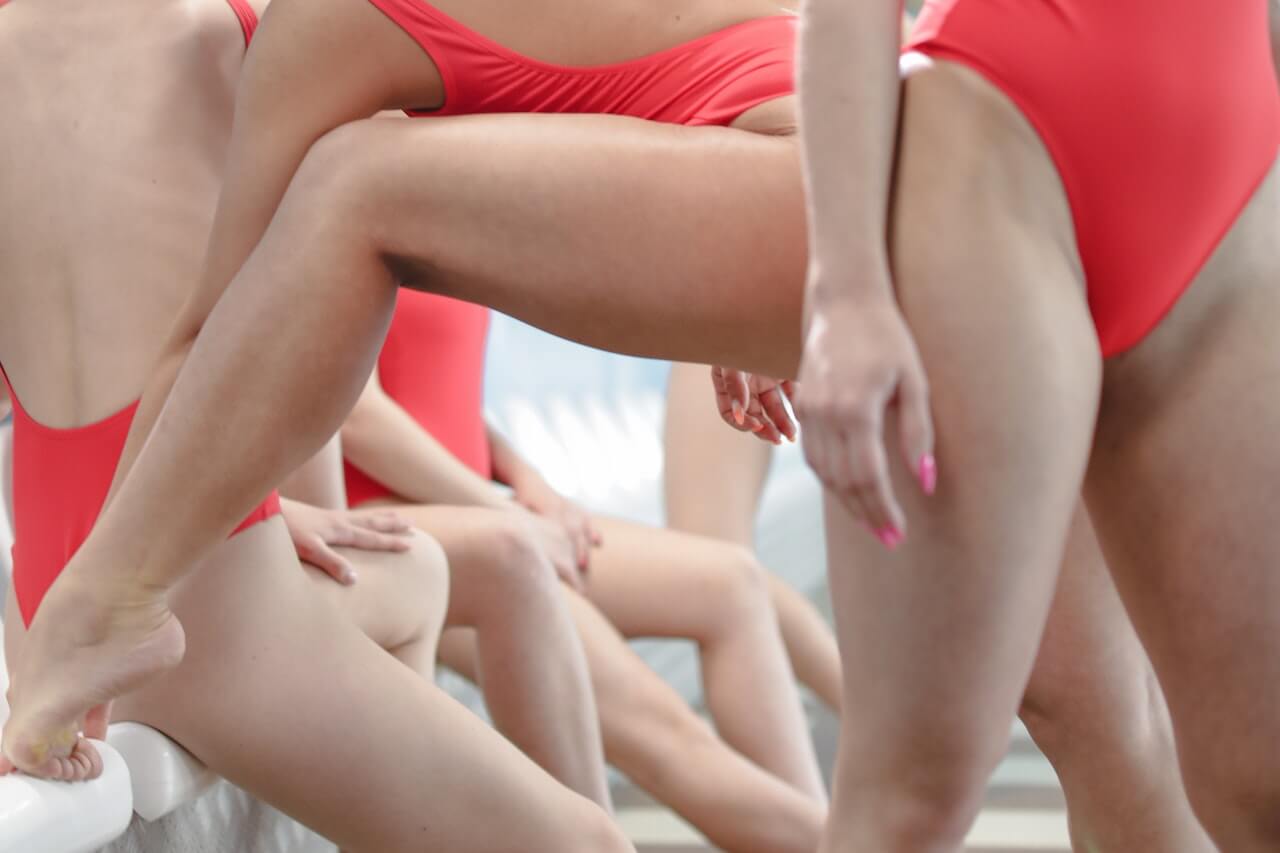Most professional swimmers shave off the hair on their arms and legs, however a minority don’t. Some astute viewers have realized this and wonder the following questions: why do some female swimmers not shave their legs?

All swimmers, not just women, must time when they shave carefully. By growing out their hair, they add an extra layer of resistance that they utilize to make training harder. Prior to a competition, they finally shave off the hair and dead skin cells which makes them feel like they can glide through the water effortlessly.
So, really, it’s not that female swimmers don’t shave their legs, but rather they are strategically growing it out to aid in their training. Keep reading on to learn some more reasons why female swimmers might let their leg hair grow out.
Understanding Hair and Hydrodynamics
The Science Behind Hair’s Impact on Swimming
When we swim, we’re constantly fighting against water’s resistance, scientifically known as drag. Every element of our body can influence this resistance, including our hair.
The common belief is that hair, particularly on the arms and legs, could potentially slow a swimmer down, resulting in less competitive times.
In an effort to reduce drag, swimmers will often shave off all of their hair (eyebrows excluded), some even going as far as to shave their head bald. Yes, even female swimmers go to those lengths.
Does Shaving Really Make a Difference?
But does shaving off that thin layer of hair actually make a significant difference? Researchers have sought to answer this question with studies and experiments, most of which suggest that body hair removal might indeed have a slight influence on swim times.
However, this difference is often minimal and might not dramatically alter the outcome of a race. The biggest benefit is more psychological than physical (swimmers feel like their smooth, freshly shaved skin allows them to glide through the water more easily), but this morale boost may help them swim harder than without it.
Hence, the practice of growing their hair out only to shave it before a competition is meant to be a morale booster more than anything.
The Practice of Shaving in Swimming

Historical Perspective
The practice of shaving in swimming isn’t a recent phenomenon. It started decades ago in the 50s when competitive swimmers sought every possible edge to enhance their performance.
However, this practice has been largely seen among male swimmers, who tend to have more body hair.
Many women, swimmers or not, already shave most of their body hair because of the expectation that they should be smooth and hairless, whereas men have little to no societal pressure to be clean shaven.
Shaving Practices Among Elite Swimmers
Again, shaving isn’t a daily routine for many professional swimmers. They often only shave before major competitions, claiming that the removal of body hair gives them a heightened feel for the water, an enhanced sense of speed, and, perhaps most importantly, a psychological boost.
You don’t want to do it too often, because then you won’t get as much of a psychological boost the day of the competition. There are some health concerns as well, which we explain below.
Why Female Swimmers Might Not Shave Their Legs
Is Shaving Really Necessary?
Although studies have indicated potential benefits of shaving for swimming, most of the benefits were psychological. But if a swimmer feels this psychological benefit isn’t worth it, then they might decide not to shave their body.
Despite some research showing only minimal actual performance enhancement, for competitive athletes at the highest level, every bit of improvement can make a difference so most will shave all of their hair even if the gains are marginal.
Influence of Personal Comfort and Societal Expectations
The decision to shave or not shave can also be influenced by personal comfort and societal norms. Some female swimmers simply prefer the feel of not shaving their legs. They feel comfortable, natural, and confident with their bodies as they are.
Moreover, the act of choosing not to shave can challenge the societal expectation that women should be hairless, turning the choice into a statement of body positivity.
However, as mentioned, growing their body hair out is more likely to be a strategic choice to increase drag during training than a body positivity statement, and they do plan on shaving it all off for a competition.
Impact of Not Shaving on Performance, Health, and Wellbeing
Does Not Shaving Affect Performance?
The fact is that the performance impact of not shaving is often negligible. However, the mental boost alone is worth it many swimmers argue. If you feel like you’re swimming faster than ever before, you can push yourself harder during a race.
Health and Skin Considerations
The frequent act of shaving can lead to skin irritations and other potential health issues such as ingrown hairs and infection. Some female swimmers may choose not to shave to avoid these complications.
Others may opt for alternatives such as waxing or laser hair removal, which can be less irritating to the skin. That said, waxing is painful and laser hair removal is expensive, so it’s not like they are without problems.
The Psychological Aspect
Swimming is as much a mental game as a physical one. Feeling comfortable and confident in one’s body can contribute significantly to a swimmer’s performance.
The choice to not shave can thus be empowering for some female swimmers, enhancing their mental well-being and their overall performance in the pool. The sensation of shaving off one’s body hair can also be equally liberating, so do what works for you.
What Do the Pros Think?
The vast majority of professional swimmers shave their body hair, so clearly the consensus is that there is a significant enough benefit that warrants doing so.
However, as mentioned, research has shown that the gains are minimal. But if shaving their body hair can even lead to a lap time improvement of a few seconds in a longer race, then that might be the difference between first and second place, or even getting a medal at all, so they are willing to shave their hair for that benefit.
Frequently Asked Questions
Is there a difference in shaving practices between male and female swimmers?
Yes, there can be a difference in shaving practices between male and female swimmers. Generally, male swimmers tend to shave more often as they typically have more body hair, which can be perceived as a potential source of drag. On the other hand, female swimmers often have less body hair, and the choice to shave is more frequently linked to personal preference and comfort. It’s worth noting that these are general tendencies, and practices can vary widely among individuals.
Are there alternatives to shaving for swimmers concerned about drag?
Certainly, there are alternatives to shaving for swimmers who are concerned about drag but prefer not to shave. These alternatives include waxing and laser hair removal, both of which can reduce body hair for extended periods of time. Additionally, wearing high-tech swimsuits made from materials designed to reduce drag can also be an effective solution. However, the overall impact of these alternatives on swim times is still a subject of ongoing debate.
Are there specific rules or regulations about shaving in professional swimming?
The decision to shave or not shave is generally left to the individual swimmer. However, rules about swimsuit material and coverage are clearly defined by bodies like FINA (International Swimming Federation), which can indirectly affect the question of shaving.
What are the health implications of frequent shaving for swimmers?
Frequent shaving can have some potential health implications for swimmers. These include skin irritations, such as razor burn and ingrown hairs, which can be uncomfortable and potentially lead to infections if not properly managed. Additionally, frequent shaving can also cause dryness and sensitivity in the skin.
Why do some female swimmers shave their legs and others do not?
All in all, the decision to shave or not to shave is highly individual. It’s a choice that reflects personal comfort, health considerations, and societal influences. If a particular female swimmer feels that shaving does not benefit them as much, or at all, then she could decide not to shave her legs.
Sources:
